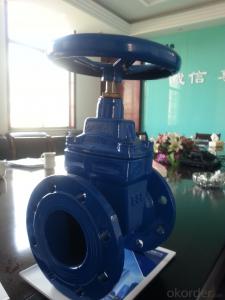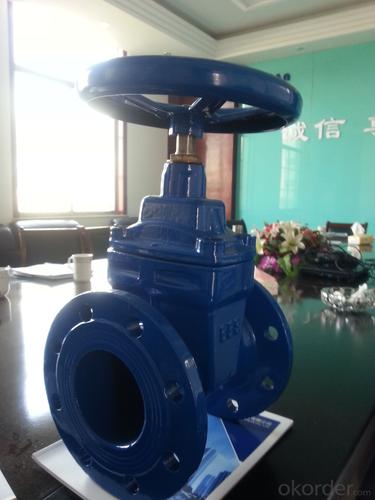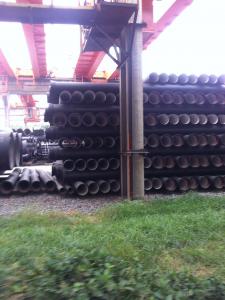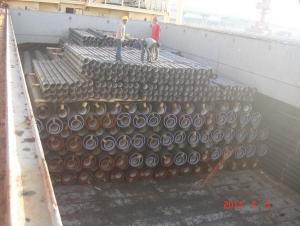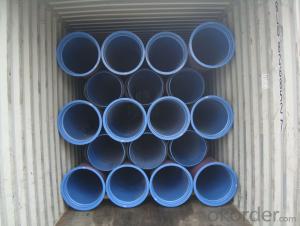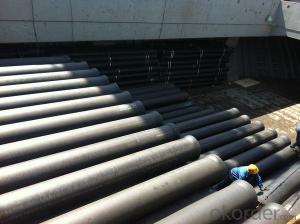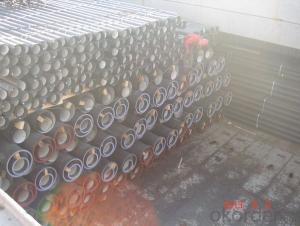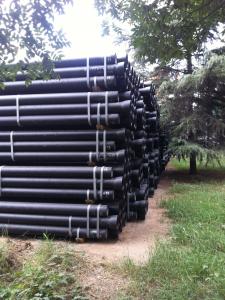DUCTILE IRON PIPES AND PIPE FITTINGS K8 CLASS DN1100
- Loading Port:
- Tianjin
- Payment Terms:
- TT OR LC
- Min Order Qty:
- 22 pc
- Supply Capability:
- 3000 pc/month
OKorder Service Pledge
OKorder Financial Service
You Might Also Like
Material : Ductile Cast Iron
Size Range : DN 80mm to DN 2000mm
Unit Effective Length : 6m or 5.7m
Manufacture Standard: ISO 2531:1998/ EN 545:2006/EN 598:2007
Annual capacity : 200,000 tons
Coating Exterior: Zinc 130g/m2 according to ISO 8179-1 and bitumen coating 70 microns.
Cement Interior: Portland Cement/ High Alumina Cement/ Sulphate Resisting Cement Lining according to ISO 4179
Special requirements on external coating and internal lining can be applied
We also provide accessories such as SBR/EPDM rubber gaskets, lubricant paste, pipe caps, PE sleeves, etc.
Additional Parts:
Each pipe is strictly inspected according to related standard to ensure permanently high performance.
Easy Installation at site and service free for life
Long Service Lifespan
Quotation will arrive you within 24hours once we get your inquiry.
We guarantee offering you a competitive price.
A copy of original inspection reports of pipes will be offered after shipment.
Photos of loading process will be sent to the customer after shipment effect.
We will follow-up the delivery progress after shipment effect and update to the customer on weekly basis.
- Q: What is the relationship between continuous cast iron pipe and ductile iron pipe?
- Continuous cast iron pipes are usually grey cast iron pipes. Its tensile strength and elongation are much lower than those of nodular cast iron. In chemical composition, grey cast iron has less carbon content than nodular cast iron. According to the organization, the graphite form of gray iron is flaky, and the graphite form in spheroidal graphite cast iron is spherical.
- Q: Can ductile iron pipes be used for geothermal energy systems?
- Yes, ductile iron pipes can be used for geothermal energy systems. Ductile iron is a strong and durable material that can withstand the high temperatures and pressures often associated with geothermal energy systems. Its resistance to corrosion and high tensile strength make it an ideal choice for transporting geothermal fluids. Additionally, ductile iron pipes can be easily joined, allowing for flexibility and adaptability in design and installation. Overall, ductile iron pipes are a reliable and cost-effective option for geothermal energy systems.
- Q: How are ductile iron pipes protected against internal corrosion caused by chemicals?
- To safeguard against internal corrosion caused by chemicals, ductile iron pipes implement various protective measures. Primarily, these pipes are equipped with either a cement mortar lining or an epoxy coating, creating a barrier between the water or sewage's chemical substances and the iron material. This barrier effectively prevents direct contact, thereby averting corrosion. Additionally, a corrosion-resistant polymer or bituminous coating is frequently applied to the pipes' exterior. This supplementary layer of protection shields the pipes from potential chemical exposure originating externally. Moreover, cathodic protection is a commonly employed technique to counter internal corrosion. Sacrificial anodes, typically composed of zinc or magnesium, are affixed to the pipes. Over time, these anodes undergo corrosion instead of the iron, sacrificing themselves to safeguard the pipes against chemical-induced corrosion. Furthermore, regular maintenance and monitoring play a crucial role in the prevention and rectification of corrosion issues. This entails routine inspections, cleaning, and prompt repair of any corroded or damaged areas. Overall, the integration of lining, external coating, cathodic protection, and maintenance practices ensures the comprehensive protection of ductile iron pipes against internal corrosion caused by chemicals. This prolongs their lifespan and guarantees the integrity of the pipeline system.
- Q: Can ductile iron pipes be used in areas with high soil settlement?
- Yes, ductile iron pipes can be used in areas with high soil settlement. Ductile iron pipes have excellent strength and flexibility, which allows them to withstand the settlement and movement of the surrounding soil without causing significant damage or failure.
- Q: How do ductile iron pipes handle ground movement in earthquake-prone areas?
- In earthquake-prone areas, ductile iron pipes are highly regarded for their exceptional resistance to ground movement. These pipes are specifically designed to endure external forces, including seismic activities and shifting ground. The remarkable flexibility of ductile iron pipes allows them to effectively absorb and distribute the energy generated during ground movement. This flexibility is achieved through the unique composition of ductile iron, which contains nodular graphite in its microstructure. The presence of nodular graphite grants the pipe with ductility and resilience, enabling it to deform under stress without breaking. During an earthquake, when the ground begins to shift, ductile iron pipes have the capacity to adapt to the changing conditions. They can elongate, compress, and bend, thereby reducing the likelihood of pipe failure. This characteristic is of utmost importance in earthquake-prone areas, as it helps prevent catastrophic failures and water loss that may occur with more rigid pipe materials. Furthermore, ductile iron pipes possess a high level of joint integrity, further enhancing their ability to withstand ground movement during seismic events. The joints of these pipes are engineered to withstand lateral and angular movement, ensuring their integrity and preventing leaks. In addition to their inherent flexibility, ductile iron pipes are often installed using techniques that enhance their resistance to ground movement. Anchoring systems, such as thrust blocks and restraints, can be employed to secure the pipes and prevent excessive movement. These systems contribute to the stability of the pipeline network and further minimize the potential for damage during earthquakes. Overall, the combination of ductility, joint integrity, and anchoring systems make ductile iron pipes an exceedingly reliable choice for managing ground movement in earthquake-prone areas. They offer a durable and resilient solution that can withstand the challenges posed by seismic activities, guaranteeing a continuous water supply and minimizing the risk of infrastructure damage.
- Q: Are ductile iron pipes suitable for use in mining tailings pipelines?
- Yes, ductile iron pipes are suitable for use in mining tailings pipelines. Ductile iron pipes have excellent strength and durability, making them capable of withstanding the harsh and abrasive conditions often found in mining operations. They have high tensile strength, which allows them to handle the pressure and weight of the tailings material. Additionally, ductile iron pipes have good resistance to corrosion, which is important in a mining environment where the tailings may contain chemicals or other substances that can be corrosive. Furthermore, ductile iron pipes are known for their ease of installation and maintenance, which can be advantageous in mining operations where time is crucial. Overall, ductile iron pipes are a reliable and cost-effective choice for mining tailings pipelines.
- Q: How does ductile iron pipe resist internal corrosion?
- Ductile iron pipe resists internal corrosion due to the protective barrier formed by its cement lining. This lining acts as a barrier between the iron pipe and the transported fluid, preventing direct contact and minimizing the chances of corrosion. Additionally, the high carbon content in ductile iron enhances its corrosion resistance compared to other types of iron pipes.
- Q: What is the expected roughness coefficient of ductile iron pipes?
- The expected roughness coefficient of ductile iron pipes is typically between 0.01 to 0.015.
- Q: Comparison of ductile iron pipe and spiral steel pipe
- Spiral welded pipe: inner wall smooth, welding connection, a small amount of pressure, need additional anti-corrosion
- Q: How do ductile iron pipes handle ground settlement near construction sites?
- Ductile iron pipes are highly resilient and can withstand ground settlement near construction sites. Due to their flexible nature, these pipes can accommodate small movements and settlement without incurring significant damage or failure. The ductility of the material allows the pipes to bend and adjust to the changing ground conditions, ensuring their integrity and minimizing the risk of leaks or breakage. Additionally, the strong and durable properties of ductile iron make it a reliable choice for underground infrastructure, providing long-term stability even in challenging environments.
Send your message to us
DUCTILE IRON PIPES AND PIPE FITTINGS K8 CLASS DN1100
- Loading Port:
- Tianjin
- Payment Terms:
- TT OR LC
- Min Order Qty:
- 22 pc
- Supply Capability:
- 3000 pc/month
OKorder Service Pledge
OKorder Financial Service
Similar products
Hot products
Hot Searches
Related keywords
